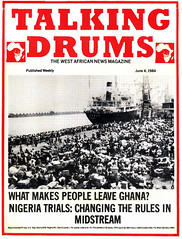Why Africa Can't Pay Debts
Markets Around Africa by Ben Mensah
The cause of this liquidity has in turn been put at the doorsteps of Third World countries who have defaulted in the payment of their debts. And the chain goes on to allege that the developing countries have defaulted due to the high American rates on the loans.
African countries, compared with Mexico, Brazil, Venezuela etc, can not be classified as very big debtors, yet it is their inability to settle their meagre loans which brings them into the lime- light of the current crisis on the money markets.
In the latest issue of the African Economic Development, the World Bank does not only report a rise in African countries indebtedness to the Western world, but also the certainty of these loans lingering on till the end of the century.
At fifty billion dollars, Africa's debts have shot up by over 500 percent within ten years from 10 billion dollars, even though they represent a mere 10 percent of the total Third World debts at 517.8 billion dollars.
But World Bank concern over the Africans' inability to pay their debts is based on the fact that their indebtedness represents a whopping quarter of Africa's Gross National Product at 192.5 billion dollars. For, no government, committed to the welfare of their people, will be prepared to part with this substantial percentage of their resources to service their foreign debts.
Meanwhile, four West African countries, Niger, the Ivory Coast, Cameroon and Senegal, are listed among Africa's ten biggest borrowers whose debts account for 50 percent of the continents' total.
Nigeria tops the list with $3.23bn, followed by Sudan $2.64bn and Ivory Coast $2.35 bn. Zaire owes $2.13 bn, Kenya $1.25 bn, Zambia $1.17bn, Cameroon $1.03bn, Madagascar $ 0.81bn, Congo $0.66bn and Senegal $0.66bn. The World Bank simply traces Africa's inability to settle debts to the all familiar problem of global infla tion, aggravated by the energy crisis of the seventies. But it is also obvious that the bank's own indiscretion in lending money to certain chaotic African governments without ensuring that such loans could be properly applied, has often saddled successive governments with the difficult task of paying loans which were badly lent.
Borrowers
It had been thought that officials of the World Bank and the other International Financial Institutions would realise that economic growth which enables a country to repay its foreign loans is dependent on the order and stability of that country's government.It is therefore odd to find the International Banks constantly lending money to the numerous military governments in Africa knowing very well their ad-hoc, unrepresentative and chaotic mode of operation.
The only possible reason for this attitude could well be the realisation by officials of the international financial institutions that in the absence of properly constituted parliaments, which normally scrutinise their terms and thereby cause delays or rejections, they can hurry through obnoxious loan agreements with little or no resistance by the military rulers.
In the past we have had military governments repudiating debts contracted by preceding civilian governments but since officials of the World Bank, IMF etc, discovered that they couldn't care what type of regimes they deal with in the Third World, the Banks' own assessment of African countries inability to settle their debts will have to take into consideration, not only the high US interest rates or global inflation, but also the determination of civilian elected governments not to honour loans that were in the first place badly lent.
Nigeria's economic policies
The policies of the present military Government are geared toward the function of imports and the intensification of internal revenue collection to broaden the revenue base of the Government, the Chief of Staff, Supreme Headquarters, Brigadier Tunde Idiagbon has said in Benin.In a message to the four-day annual conference of the Nigerian Economic Society at the University of Benin, Brigadier Idiagbon pointed out that this "inward-looking development strategy" would create obvious problems for the people, but noted that the Government had no alternative but to adopt it.
He said that from now the country should strive to produce enough food to feed its growing population, build truly Nigerian houses to shelter the people and use available local raw materials to run the industries.
The Chief of Staff also pointed out that the basic weakness of the Nigerian economy was its over-dependence on the external sector.
He said that from now the country which could have provided the base for an "internal engine" of growth, had been neglected for the past years. Agricultural exports, such as cocoa, groundnut, rubber, coffee and palm produce which the country exported before, he said, had declined, adding that these commodities were now being imported to sustain the local manufacturing plants.
Brigadier Idiagbon explained that the war against indiscipline (WAI) was launched to make Nigerians "look inward and be content with whatever we have". He, however, solicited the advice of Nigerian economists on how to make the self-reliance policy of the Federal Government succeed since, according to him, "the policy was bound to have its merits and demerits".
He urged the economists to consider the peculiar social and economic circumstances of Nigeria and prescribe development strategies suitable to the realities of the nation. The speech was read on his behalf by the Bendel Military Governor, Brigadier Jeremiah Useni.
